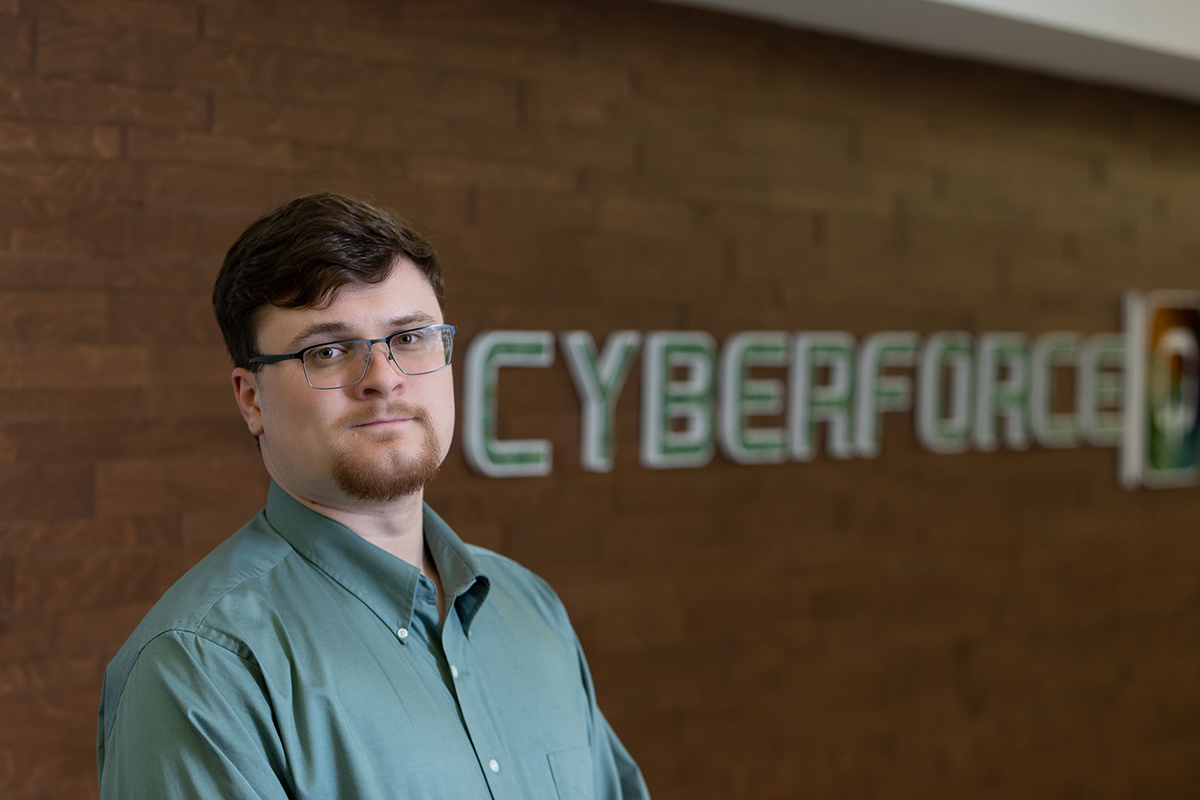
Washtenaw Community College prepares plenty of students to transfer to four-year universities, but also sends many of its alumni straight into the workforce.
For Alexander Sabin, who works in an industry that often requires a bachelor’s degree to climb the corporate ladder, a WCC associate degree and his own dedication to continuous learning has been enough to launch him into a successful cybersecurity career.
“I took one semester at a four-year university and just dropped out,” Sabin says. “The content was 10 years old and I was paying $1,000 per credit hour. At WCC, I had already learned the fundamentals I needed that never go out of style.”
While finishing his Associate of Applied Science in Cybersecurity at WCC, Sabin created a LinkedIn profile that led to a summer internship at CyberForce|Q (CFQ), a Plymouth-based company that describes itself as “a collective of cybersecurity professionals that acts as a force for good in the cyber realm.”
After his graduation and internship in 2020, he continued training at CFQ, then received a full-time cybersecurity analyst position there. A few promotions later, the 24-year-old is nearing a six-figure income as a senior analyst and platform developer working with high-end healthcare clients.
Check that same LinkedIn profile today and you’ll see nine different licenses and certifications Sabin has earned since enrolling at WCC, an essential part of staying relevant in a field that changes as fast as cybersecurity.
“The industry is constantly evolving, which is why certifications are so important,” Sabin says. “At CyberForce|Q, we pride ourselves on being technologically agnostic, we can work seamlessly with whatever tools each client has. So I’m learning new tools and techniques on a week-by-week basis.”
While at WCC, Sabin helped found and eventually served as president of the college’s White Hat Society, joining a group of clubs across the nation dedicated to putting into practice the hands-on, real-world applications of its student members’ cybersecurity classroom studies.
In the cybersecurity world, “white hat” hackers are known as ethical hackers, proactively using their skills to find and repair security weaknesses before malicious “black hat” hackers can compromise systems, steal data or take down networks.
White Hat Society club meetings give members the opportunity to improve their soft skills and build a network of like-minded people who can choose to compete in regional and national ethical hacker competitions.
Sabin, a participant at the National Cyber League’s Spring 2020 competition where the WCC club placed 62nd out of 931 teams, continues to support the White Hat Society, speaking at meetings and arranging presentations by CFQ colleagues on social networking issues and tips on making a positive impression while interviewing for a job.
He encourages current club members to pursue a career in cybersecurity. And, in fact, he hasn’t ruled out teaching it himself someday. It is in his blood — his grandmother, Rosalyn Culver, was an instructor at WCC from 1989 to 2006.
“There’s a massive need for people in the industry. The growing focus on automotive cybersecurity will only increase the demand,” he said. “The foundation in cybersecurity and soft skills I built at WCC opened the door to a great position. My associate degree was all I needed to begin working in an exciting, ever-changing field. My connections and the teams I work with continue to expand my knowledge.”
He credits the hands-on instruction and lower cost of the education he received at Washtenaw for his success. He put himself through WCC while bartending at night and graduated debt-free.
“The value is through the roof! I would not be where I am today without WCC,” Sabin said. “I cannot stress enough the importance of having a learning center that provides a relevant and affordable education.”
Tags: Alumni Profile, March 2022, On The Record, Student Organizations, cybersecurity
